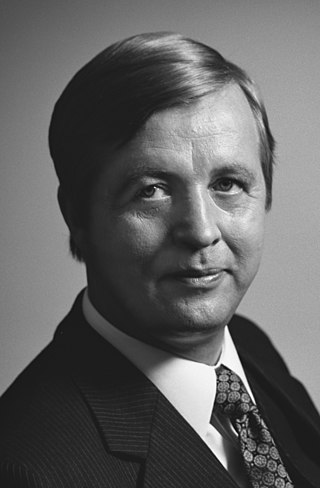
Taisto Kalevi Sorsa was a Finnish politician who served as Prime Minister of Finland three times: 1972–1975, 1977–1979 and 1982–1987. At the time of his death he still held the record for most days of incumbency as prime minister. He was also a long-time leader of the Social Democratic Party of Finland.
The Swedish People's Party of Finland is a Finnish political party founded in 1906. Its primary aim is to represent the interests of the minority Swedish-speaking population of Finland. The party is currently a participant in the Government of Petteri Orpo, holding the posts of Minister of Education, Minister for European Affairs, and Minister of Youth, Sport and Physical Activity.

Keijo Antero Liinamaa was a Finnish lawyer and politician who served as caretaker Prime Minister of Finland from June to November 1975.
Finnish national income policy agreements or comprehensive income policy agreements are tripartite agreements between Finnish trade unions, employers' organizations, and the Finnish government. They are policy documents covering a wide range of economic and political issues, such as salaries, taxation, pensions, unemployment benefits, and housing costs. They represent collective bargaining taken to its logical maximum, reaching virtually all wage-earners. Their enforcement is made easier by the universal validity of collective labour agreements. However, they are voluntary agreements and are not considered government legislation, i.e. they do not represent central planning of the economy.

Kustaa Rafael Paasio, born Hellström was a prominent Finnish politician and editor from Social Democratic Party. He served as Prime Minister of Finland twice.

Varsinais-Suomi is one of the 13 electoral districts of the Parliament of Finland, the national legislature of Finland. The district was established as Turku and Pori Province South in 1907 when the Diet of Finland was replaced by the Parliament of Finland. It was renamed Varsinais-Suomi in 1997. It is conterminous with the region of Southwest Finland. The district currently elects 17 of the 200 members of the Parliament of Finland using the open party-list proportional representation electoral system. At the 2023 parliamentary election it had 398,903 registered electors.
Parliamentary elections were held in Finland on 20 and 21 March 1966. The Social Democratic Party (SDP) overtook the Centre Party as the largest faction in Parliament. Rafael Paasio of the SDP subsequently became Prime Minister and formed a popular front government consisting of the SDP, the Centre Party, the People's Democratic League (SKDL), and the Social Democratic Union of Workers and Smallholders (TPSL) in May 1966.
Parliamentary elections were held in Finland on 15 and 16 March 1970.
Parliamentary elections were held in Finland on 2 and 3 January 1972.
Valtioneuvos is a Finnish title of honor awarded by the President of Finland to elder statesmen. It is one of two titles in the highest class of State of Finland honors. A tax on the titles of 48,400 euros or 12,100 euros must be paid by whoever proposes the title to a holder.

Pentti Vihtori Holappa was a Finnish poet, writer and politician. Born in Ylikiiminki to a relatively poor family of modest means, he held numerous jobs before becoming a political journalist and eventually obtaining a government post. He was self-educated, but produced around fifteen volumes of poetry, as well as several novels and essays. He also worked as a translator; among the poets and authors whose work he translated into Finnish are Charles Baudelaire, Pierre Reverdy, and J. M. G. Le Clézio. He received the Finlandia Prize in 1998 for his novel Ystävän muotokuva: Portrait of a Friend.
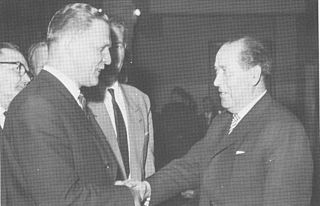
Veikko Kullervo Helle was a Finnish politician representing the Social Democrats.
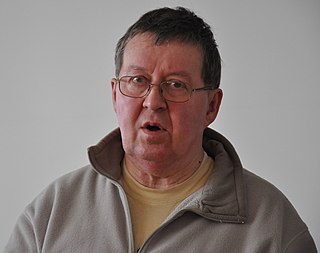
Pertti Kullervo Paasio was a Finnish politician from the Social Democratic Party. He was born in Helsinki.
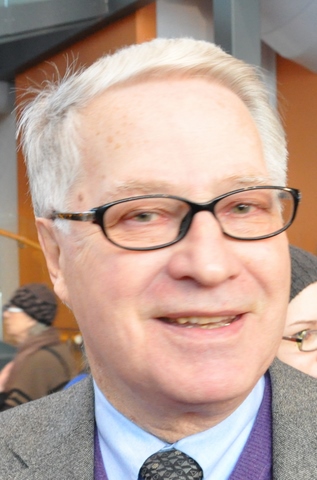
Pekka Paavola was a Finnish politician, a minister of justice, and a convicted criminal in multiple cases.

Kekkonen's second cabinet was the 34th government of Finland, which existed from 17 January 1951 to 20 September 1951. It was a majority government, and its Prime Minister was Urho Kekkonen.
Paasio's first cabinet was the 50th government of Finland, which lasted from 27 May 1966 to 22 March 1968. It was a majority government based on the popular front model. The cabinet’s Prime Minister was Rafael Paasio.
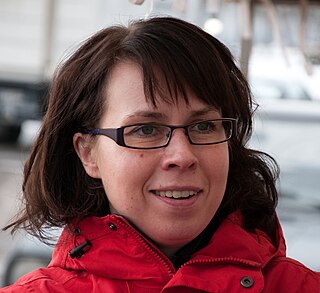
Heli Tuulikki Paasio is a Finnish politician from Turku. A Social Democrat, she was member of the Parliament of Finland for Finland Proper from 1999 to 2015.
Paasio is a surname. Notable people with the surname include:

Margit Marjatta Margareetta Eskman was a Finnish politician. She was a member of the Parliament of Finland from 1966 to 1975, representing Turku Province North as a member of the Social Democratic Party. She was the Second Minister of Finance from February to May 1972, the first woman to hold that position. Eskman later served as the director-general of Finland's national social security agency and the National Board of Social Welfare.












